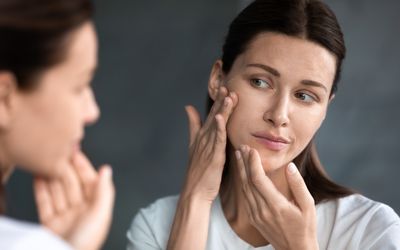Polycystic ovary syndrome (PCOS) has become one of the most common hormonal disorders in women worldwide. Women of reproductive age deal with the trouble of this disorder and the effect it has on various aspects of the body. After your diagnosis with PCOS, your doctor may suggest most therapies that cater to your physical symptoms because they are visible to the eye. Seldom do we spare attention to the mental aspect of this disorder and the exhaustion that comes with dealing with the diagnosis and the symptoms. Apart from the metabolic concerns, the psychological concerns need equal amounts of attention. A few research studies state that the frequency of anxiety and depression are significantly higher in women with PCOS and they also carry a higher risk of these problems.
Anxiety and Depression:
Anxiety can be described as a constant feeling of worry and fear that clouds over a person’s thoughts. And if not tended to, it can become difficult and persistent too. Women with PCOS can get anxiety because they constantly worry about their body and the symptoms of PCOS causing harm to their health.
In today’s world, depression has become a common mental illness among the mass. As common as it is, its seriousness cannot be undermined by the fact that it can very gravely affect the way you think or feel. Patients with a chronic illness such as PCOS have suggestively reported that they have negative feelings and thoughts about their bodies and health. It reduces your ability to function properly every day. But then, the question arises.
How and Why does PCOS affect mental health?
In PCOS, there is an imbalance of hormones that women experience and the symptoms of PCOS can be a big contributor to the poor mental health of these women. The imbalance and abnormality in the levels of hormones such as testosterone can cause physical symptoms such as excess in hair growth (hirsutism), loss of hair (alopecia), weight gain, and really stubborn acne. These symptoms can make women feel anxious and conscious about themselves.
A major part of this anxiety stems from the way a person feels about their body, also known as body image. As individuals, we all might have different imagery of how we should look, and that is heavily based on a number of factors such as how you understand your own body, how you perceive fitness in general, your own body size and personal values.
PCOS can affect various parts of your our body and can cause physical changes, which in turn, influence how you think about your own body part. The way you look and the way you present yourself to the world is affected and is also a reason for low self-esteem. In such circumstances, women with mental support in PCOS feel cornered and lonely and feel frustrated when they feel that they do not fit into the standards of beauty of society. There is a constant fight within themselves about accepting their diagnosis and symptoms and the way they are “supposed to look”. This can affect your self-confidence, your moods, and even your relationship with people, leading to an increase in the risk of getting anxiety or depression.
Unpleasant and negative feelings can be caused due to a number of reasons if you have PCOS. Did you know that women with PCOS are thrice as likely to get emotionally stressed than people without PCOS? This emotional stress, if not treated timely, can lead to more serious mental health problems such as depression and anxiety. These symptoms are varied and can be confusing to the women especially if the cause of the symptoms is unknown.
Not only do the physical symptoms bother a woman with PCOS, there is also an anxiety that is linked to her ability to conceive. In a culture where there are a lot of expectations tied to the women and their childbearing capacity, many women with PCOS resort to assisted reproductive technologies to get pregnant. The couples who undergo such treatments often feel emotionally and financially drained which just adds to their mental health negatively. These symptoms and limitations can deeply distress a woman with PCOS and increase the risk of getting anxiety and depression along with a few other problems such as an eating disorder or even compulsive disorders.
In times when you feel lonely or overwhelmed with your symptoms or thoughts, it is good to connect with women over support groups and talk about it. It is also important to inform your doctor about your feelings so that they can guide you accordingly. Also, check our other blogs here.

